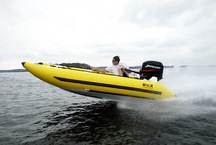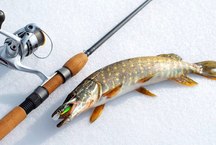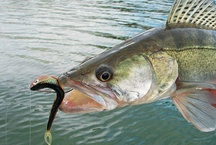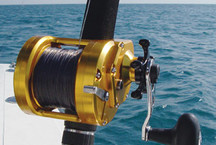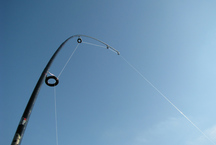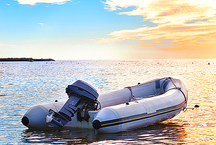5 best oils for boat motors
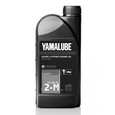

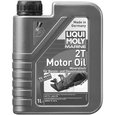

Not so long ago, the phrase “oil for outboard motor” was puzzling - the Soviet “Whirlwinds”, “Breezes” and other meteorologist's set were used by the good old autol, diversifying the life of the owner with such entertainments as “cleaning the carbon from the piston rings” and “burning coked muffler ". But with the appearance of the first-used "Japanese" and then the current variety of engines from China to America, we had to forget about it - high powered boat engines require the best and most high-quality, and not "just light" oil.
There are two obvious categories of oils for boat engines:
- Two stroke oils get into the crank chamber in meager amounts - on carburetor engines mixed with fuel, on modern engines with direct injection like Evinrude through a separate nozzle. Accordingly, they must have high antifriction properties - where the amount and pressure of oil are decided on a four-stroke, only quality remains on a two-stroke. But the life of the additives is not important - the oil that got into the engine burns in it. Accordingly, it should burn with a minimum of smoke and soot. The last feature is the presence of a dye that allows you to accurately distinguish the prepared fuel mixture from pure gasoline.
- Four stroke oils must withstand long heating-cooling cycles, effectively splashing and holding onto the surfaces of parts, and the list of requirements can be continued for a long time. But to the requirements common to motor oils, boat engines add specific ones: safety when in contact with water (and salt water as well), which is explicitly stipulated by the NMMA FC-W standard, slow aging at high engine speeds - unlike a car engine, most of the boats time running close to the maximum speed.
| Category | A place | Name | Rating | Price |
|---|---|---|---|---|
| The best oils for 2T outboard motors | 1 | Motul Outboard Synth 2T | 9.9 / 10 | 1 400 |
| 2 | Yamalube 2-M TC-W3 RL Super 2-Stroke | 9.5 / 10 | 540 | |
| 3 | LIQUI MOLY Marine Fully Synthetic 2T | 9.4 / 10 | 1 500 | |
| The best oils for 4T outboard motors | 1 | Motul Outboard Tech 4T 10W-30 | 9.9 / 10 | 590 |
| 2 | Quicksilver 4-Stroke Marine 10W-30 | 9.5 / 10 | 772 |
The best oils for 2T outboard motors
|
Motul Outboard Synth 2T
1 400 (for 1 l)
If the French company cannot boast of the status of a giant on the automotive oil market, then it is successful in the entertainment technology environment: it has practically become a monopolist in the motor oil segment, and a wide choice of lubricants for ATVs and snowmobiles has also proved itself.
Passing the boat engines of the French, of course, could not. The oil represented is pure synthetic, made traditionally for a brand on an ester basis. Specific requirements for interaction with water are fully met, which is confirmed by a certificate of class TC-W3. Considering the pressure that ecologists have recently put on manufacturers of two-stroke engines, Motul did everything possible to “clean” the exhaust. The synthetic basis allows in most cases to use a fuel mixture of 1: 100, and only in sports engines and under high loads, switch to a mixture of 1:50, which, by the way, justifies the high price of oil: for two-stroke engines it is more reasonable to consider the cost of oil in terms of volume fuel with which it will burn. The exhaust smoke is minimal, and the oil itself is biodegradable to at least 85%. Oil, of course, can work not only in carburetor engines - modern two-stroke fuel injection engines will also “digest” it without any problems. Considering the aggressive policy of Motul in the entertainment market, it will not be a problem to buy this oil, and this is another plus in the "piggy bank".The best popular oil for a two-stroke outboard motor. Main advantages:
Minuses:
|
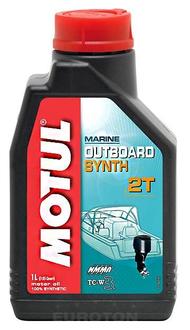 9.9 / 10
Rating
Reviews
If it were not for the characteristic sound of the engine, I would have thought myself that I have a four-tactic - there is practically no smoke, all the more, the smell of burning. |
|
Yamalube 2-M TC-W3 RL Super 2-Stroke
540 (for 1 l)
Yamakhov's engine oil has been a monopolist for a long time, especially in small cities: having bought a Yamaha engine in one of the micro-dealer stores bred in the 90s, there were only two options - or pour mineral water into gasoline at your own risk and risk, or in the same store to buy "original" oil. On the one hand, the price is 5 and a little hundreds per liter of the “original” (read, by definition, with an extra charge) oil, and specialized oil, the price is small. But let's not forget that before us is "mineral water", and the concentration of 1: 100 indicated in the advertising booklet should be treated skeptically. Most owners of boat engines prefer to reinsure, diluting gasoline at a ratio of 1:50, and in this case each liter of fuel rises in price by 10.8 rubles: a result close to the price of synthetics. However, in practice, this oil for boat engines shows itself well - carbon deposits on the pistons are moderate, smoke is minimal. The duration of storage of the prepared mixture is limited more by the quality of the fuel: the separation does not occur for a long time, and rather, the gas itself will noticeably deteriorate its properties. Main advantages:
Minuses:
|
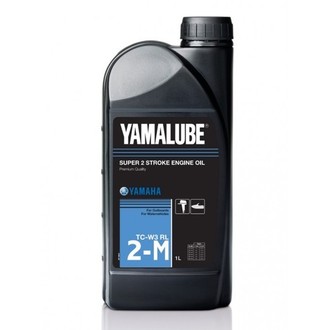 9.5 / 10
Rating
Reviews
Yamahovsky motors for a boat I have been using for twenty years. All the time only on company oil - minimum wear, carbon deposits in the cylinders minimum. Good butter, worth the money. |
|
LIQUI MOLY Marine Fully Synthetic 2T
1 500 (for 1 l)
The main advantage of this oil for outboard motors is its wide availability: now even in a small town you can find a specialized motor oil shop that works with Liqui Moly dealers, and there is a place in the corner of its window and specialized oils (usually just boat and motorcycle). But the price is not his trump card: even Motul is overtaken, never considered a budget. Each liter of gas when using Marine 2T will cost 15 rubles. What Liqui Moly managed to achieve is leadership - it’s in reducing the flash point: this oil is only 120 C, which is two times less than that of Motul. But the benefit from this is controversial: on the one hand, this will ensure the complete combustion of the oil even in a cold engine, but on the other hand, the quickly burnable oil must be added to the mixture in an increased amount, since it will form a smaller oil film on the cylinder walls, almost completely burning out during working stroke. In the end, if you follow the voice of reason and go to a concentration of 1: 75-1: 80, the use of Liqui Moly will become even more expensive. If we abstract from the price, then Liqui Moly managed to create a product of decent quality - the oil does not smoke during combustion, the formation of soot on the bottom of the piston and under the rings is small. 80% biodegradability is also worth noting. Main advantages:
Minuses:
|
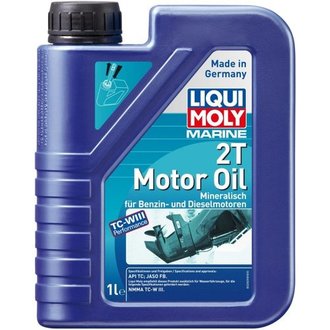 9.4 / 10
Rating
Reviews
We don’t have much choice in the city - either the LM or the Suzuki brand dealer. At the same price and, in my opinion, comparable quality, I prefer to buy everything in one store: for the car, and for the boat. |
The best oils for 4T outboard motors
|
Motul Outboard Tech 4T 10W-30
590 (for 1 l)
The victory in the ranking of the best four-stroke oils for outboard engines was given by Motul even more easily than among the two-stroke ones: quite affordable price was added to all the advantages of the oil. In the classification of Outboard oils, the type of oil basis is determined by the last word of labeling: if in the case of Outboard Synth everything was clear and true, then Tech is semi-synthetics (abbreviation of the company name of the production technology - Technosyntese). Well, the use of a semi-synthetic base for four-stroke oil is justified: the price is reduced, and it can withstand service intervals not worse than more expensive synthetics. In this line, the manufacturer continued the tradition of ensuring safety when mixing different types of oils: as in the case of Motul motor oils, the Outboard series allows mixing semi-synthetic oils with mineral and synthetic oils without any restrictions. This is convenient when buying a boat motor with hands: you can change the unknown oil to Motul without flushing and not fear the consequences. **14**
**15**
**19**
Main advantages:
Minuses:
|
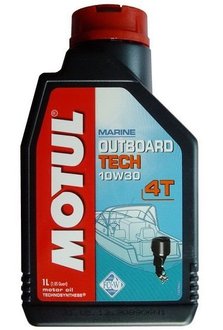 9.9 / 10
Rating
Reviews
I first used the brand (Suzuki by Motul), then I switched to the Outboard: it was bottled in the same factory, but cheaper. Feels like no difference. 100 hours without any problems |
|
Quicksilver 4-Stroke Marine 10W-30
772 (for 1 l)
Among the owners of low-volume four-stroke boat boats, Belgian oil has gained considerable popularity. A number of oil requirements for these engines are very specific: if, for example, in an automobile motor all loaded points are lubricated under pressure, then in the outboard most of them receive lubrication only by spraying - accordingly, low viscosity oil is required that quickly spreads around the engine even at low revs. Given that four-stroke engines are often acquired for fishing by trolling, when the engine is running at low to medium speed for a long time, it is simply necessary to choose for them a light oil. The quality of oil is clearly indicated by the fact that it is recommended for Mercury engines with power up to 60 horsepower. As a matter of fact, in America it is sold under the brand of Mercury, being used in factory refueling and in servicing at dealer services. And, of course, it can be used without any problems in any other four-stroke outboard motors. Main advantages:
Minuses:
|
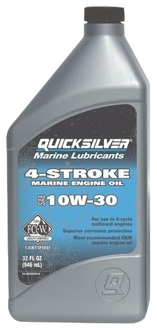 9.5 / 10
Rating
Reviews
I buy for two engines - it works equally well in the Honda on an inflatable boat, and in a large Mercury on a boat. |
So, what kind of oil is better to pour into the outboard motor?
In fact, there are no objectively “best” or “worst” boat oils: each of them has both advantages and disadvantages. The main thing is that the purchased oil corresponds to the engine's tact and has the FC-W approval. The only recommendations we can give are:
- For low capacity 4T motors choose only low viscosity oil: 15W40 boat oil and the like are designed for large, stationary engines with oil pumps and pressure lubrication.
- Acquisition of synthetics is advisable only with a large seasonal operating time - the oil will still have to be changed during conservation, even if the motor did not set up the necessary engine hours during the season.
- But for dvuhtaktnikov Synthetics are preferable - the ability to work in low concentrations pays a higher price. Especially synthetics are “useful” to volumes of small cubic capacity, which almost always work at high speeds. Well, and if in the upper head of the connecting rod there is not a needle bearing, but a sleeve ...
- Cheap Chinese motor - not a reason to save on oil (just this often “kills” them).Think for yourself: if the engine is made of less quality materials than the original “Japanese”, then it is precisely for him that he needs more effective protection against wear: low-quality oil will only reduce the resource.
